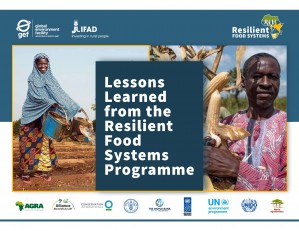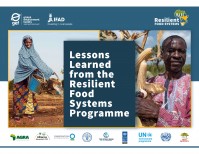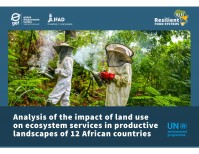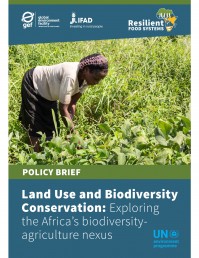Participatory Village Land Use Planning in Tanzania
16 June 2023
The United Nations defines Sustainable Land Management as the use of land resources, including soils, water, animals and plants, for the production of goods to meet changing human needs, while simultaneously ensuring the long-term productive potential of these resources and the maintenance of their environmental functions.
Rapid population growth generates increasing demand on agricultural production, resulting in mounting pressure on the soils, forests, rivers, plants, and animals that we depend on for healthy food systems.
In the 12 RFS countries, households living in extreme poverty in rural areas rely on subsistence farming for their food and livelihoods with few alternative options. Smallholder farmers are often caught in low productivity traps whereby unsustainable agriculture and livestock rearing practices deplete and degrade natural resources, which, in turn, compromises ecosystem services and results in pervasive low agricultural yields.
This cycle renders rural smallholder farmers extremely vulnerable to climate change, climate variability, and extreme weather events. Increasing temperatures, changes in rainfall patterns, droughts and flooding directly impact land health by increasing erosion, drying soils, and destroying vegetation cover. This leads to a further decline in agricultural productivity. When paired with rapidly growing populations, these climate impacts often drive an expansion and intensification of agricultural production on already degraded land.
SLM incorporates a wide variety of approaches, including Climate-Smart Agriculture, Conservation Agriculture and agro-ecological approaches, to protect, conserve and rehabilitate natural resources. SLM approaches work to restore ecosystem functioning and promote the sustainable use of natural resources in order to ensure the productive capacity of these resources now and in the future. By improving the health and productive capacity of natural resources within communities, SLM approaches aim to improve agricultural yields, enabling smallholder farmers to achieve food and nutritional security and improve their livelihoods.
In addition to achieving beneficial socio-economic outcomes for communities, SLM practices improve ecosystem functioning and protect biodiversity. SLM interventions focus on improving water availability, improving soil health, and reducing biodiversity loss. These focus areas are particularly significant when it comes to adapting to climate change and reducing vulnerability to extreme weather events. For example, by introducing crop cover and improving the water retention of soil, smallholder farmers can simultaneously improve yields while increasing resilience to increases in temperature, decreases in rainfall, and drought. By reducing deforestation, improving livestock management, and promoting agroforestry approaches, SLM further contributes to global climate change mitigation efforts.
Sustainable Land Management incorporates a wide variety of approaches that work to increase land productivity, improve water availability and water use efficiency, improve soil fertility, prevent and rehabilitate land degradation, improve management of plants and livestock, and improve biodiversity. Within these approaches are common practices and technologies: improvement in plant varieties, minimum soil disturbance, vegetation management, soil erosion control, water harvesting, and agroforestry, amongst others.
RFS country projects teams are facilitating the adoption of a wide range of practices and technologies through interventions that are tailored to the specific country context. For example, in Niger, Malawi, and Tanzania, country project teams are establishing and capacitating community committees to develop and implement local plans for natural resource and rehabilitation management. In Burundi and Uganda, FAO is using the Farmer Field School approach to train farmers in soil and water conservation, establish demonstration plots and conduct field visits to share best practices and develop smallholder capacity in applying successful practices.
Explore the RFS Country Projects to see more examples of how RFS countries are implementing Sustainable Land Management activities.
Stories from the Field
Explore our stories from the field to learn more about how RFS country project teams are implementing activities related to the programmatic theme of Sustainable Land Management.
Relevant resources
We have a growing library of reports, briefs, case studies, media, tools and guidelines. Explore all resources related to Sustainable Land Management to get greater insight into our programme activities.


Integrated Approach Pilot (IAP) programmes were conceived as part of the Global Environment Facility (GEF) 2020 Strategy to test the delivery of integrated approaches that address discrete, timebound, complex, global environmental challenges. In its Sixth Replenishment Cycle (GEF6), three IAPs were funded: Sustainable Cities, Taking Deforestation out of Commodity Supply Chains, and Fostering Sustainability and Resilience for Food Security in Sub-Saharan Africa, also known as the Resilient Food Systems (RFS) programme.
The RFS programme serves as an outstanding example of different partners and countries with distinct mandates joining forces to pursue a shared objective, leveraging their respective strengths to transform food systems in Africa. It highlights the significance of clearly articulating the programme’s vision, establishing a well-defined division of labour, and delineating roles and responsibilities from the outset, forming the foundation for an accountability framework. Moreover, the RFS underscores the importance of adopting a nexus approach that integrates food security, agriculture, environment, socio-economic, and climate considerations.
This holistic approach recognizes the interconnectedness of these sectors and the need for holistic solutions. The RFS’s systems-based approach brings together multiple partners at different levels and fosters information flows in both directions, supporting collaboration and knowledge sharing.
This publication presents some of the main lessons learned from the RFS programme, which lasted for six years between 2017 and 2023. It provides a reflection on the implementation, lessons learned, and observations around the key components of the RFS. The programmatic value-add of the RFS and the manner with which it was harnessed during implementation is conveyed through case studies drawn from the experience of the country projects across these components.


This report explores the impact of changing land use on ecosystem services and productive landscapes in Africa. It has been developed under the Resilient Food Systems programme, one of three pilot programmes that form part of the Global Environment Facility’s sixth replenishment cycle (GEF-6). The Resilient Food Systems programme targets agroecological systems in the drylands of sub-Saharan Africa, where the need to enhance food security is directly linked to opportunities for generating local and global environmental benefits. Sub-Saharan African countries are seriously affected by environmental degradation and loss of ecosystems, resulting in persistently low crop and livestock productivity, as well as increased food insecurity for millions of smallholder farmers, with preponderant impacts on vulnerable groups such as women and youth.


This policy brief explores the nexus between agriculture and biodiversity within the broader context of land use change in Africa. It highlights key challenges for the continent as it seeks to ensure food and nutrition security and develop agro-industries, while at the same time protecting and restoring the region’s natural capital, including its biodiversity. The brief argues for closer collaboration between environmental and agriculture stakeholders in support of sustainable solutions to Africa’s challenges related to development, food security and nutrition, and biodiversity.